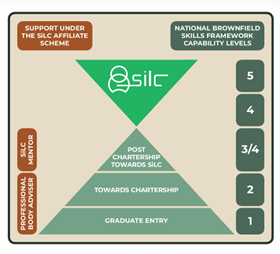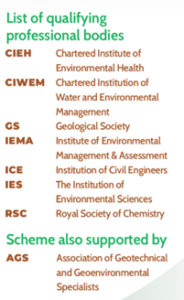We’ve made it; a 15 minute video to promote the SiLC Affiliate Scheme, which you can watch at https://www.silc.org.uk/affiliate-scheme. We had a very small budget to make this, but individual SiLCs have done a grand job in sending in video clips recorded during the covid pandemic lockdown using their mobile phones and telling us why they get excited about contaminated land, why they came into the profession and why they became a SiLC and NQMS SQP. Watch it and see what they have to say. None of the responses were scripted. Each contributer was sent a short list of questions and whatever they say is in their own words. The contributers also provided the interesting photographs that you will see in the video.
The video is mainly directed at young people, particularly undergraduates or graduates, with the primary purpose of encouraging them to look at the geoenvironmental industry as a career path but also, of course, to join the Affiliate Scheme, become chartered and in due course become a SiLC. However, others who are more advanced in their careers can also join and many have so far done so.
All the contributers to this video show that they are confident in the profession they have chosen and talk with such contagious enthusiasm that ‘who would not want to join them’ in such a rewarding career. They talk with passion about the variety of work that they get involved in, ‘never a dull moment’ as they say, and the variety of disciplines with which they interact. As Ian says, this is an industry with a wide range of specialist skill sets with no one degree or expertise area defining the contaminated land and brownfield sector. Lucy also mentions all the countries around the World that she has worked in as a geoenvironmental specialist as well as across the UK, saying, I travel and get paid for it, so who wouldn’t enjoy that?
Sarah, who is the only one in the video who is not yet a SiLC, but aspires to be one, is really enthusiast about playing her part in the clean up and return to productive use of derelict, contaminated and unsightly sites. Ian, Eleanor and James also talk about maximising the reuse of brownfield sites, making the best use of our overall limited land supply and turning contaminated and derelict sites into beneficial use for communities and at the same time helping to protect our countryside and green spaces against increasing pressure for development.
Danny comments that being a SiLC is a mark of esteem, is part of career development and builds confidence in his own ability. James says that it reflects that you have been assessed by your peers in a thorough and competent manner and you really do deserve to be considered a competent professional. Sarah believes that it helps when dealing with clients as it is a means of demonstrating your credentials and builds confidence that sound advice will be given. Lucy notes that being a SiLC and SQP helps to increase professionalism in our industry by amongst other things being tansparent in identifying the uncertainties in our work and the implications of our conclusions. Improving quality has to be the objective of everyone in our industry and these schemes are part of this process to the benefit of clients, regulators and anyone else with an interest in brownfield regeneration. As indicated by Simon, it is win-win all round.
The SiLC Affiliate Scheme was launched in 2018 and since then both graduates and those more advanced in their careers have joined. They benefit from access to an ‘adviser’ provided by their chosen professional body as they work towards chartership. Once they attain their chartership they have access to a ‘mentor’ provided by SiLC as they work towards SiLC Registration. Some who are already chartered have also joined.
This diagram shows the relationship between the Affiliate Scheme, the National Brownfield Skills Framework (NBSF, which can be found on the SiLC website and is referred to in the NQMS) and the stages at which the adviser and mentor provide support. An applicant can join the scheme at any stage.
The Advisor provides guidance on gaining chartership with the candidates chosen professional body, the do’s and don’ts and the level of experience required to apply for chartership. They will be familiar with the requirements of their professional body and how this fits into the SiLC programme, but will not necessarily be a SiLC.
The Mentor is a SiLC who is familiar with the level of expertise and experience needed to take the SiLC exam and give advice on how best to fill any gaps. This is an ongoing process with reference to the NBSF, until the candidate is ready to take the SiLC/SQP exam. They can also advise on some of the key aspects that the assessors will be looking for at interview.
This scheme is for those who have a genuine interest in the brownfield land sector, are graduate members (or the equivalent) of one of the qualifying professional bodies, are aiming to become chartered and to join the SiLC Register and have a commitment to the code of conduct of their chosen professional body and that of SiLC.
If this is for you or someone in your team, then visit https://www.silc.org.uk and find out more.

